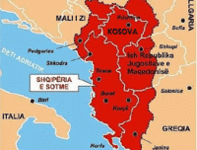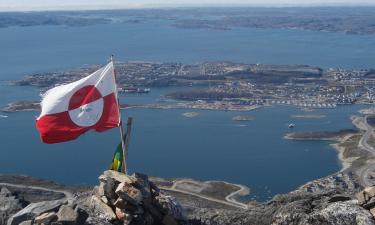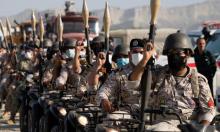The fire of ethnic strife may burn in Macedonia again
 The Former Yugoslav Republic of Macedonia can become the next hot spot in the world. Recently, the local Interior Ministry called the administrators of Facebook to block the profiles of the users who incite ethnic strife. It is not ruled out that the country may soon become another stage for the Slav-Albanian conflict.
The Former Yugoslav Republic of Macedonia can become the next hot spot in the world. Recently, the local Interior Ministry called the administrators of Facebook to block the profiles of the users who incite ethnic strife. It is not ruled out that the country may soon become another stage for the Slav-Albanian conflict.
In mid-February in the capital of the country Skopje a brawl broke out between Macedonians and Albanians. The latter did not like the fact that a museum shaped like an Orthodox church will be placed in the city center. As a result, eight individuals, including policemen who tried to bring order, were injured with various degrees of severity.
After the incident Macedonian Interior Ministry has asked the administration of Facebook to deactivate the profiles and pages of the groups that citizens have created to appeal to ethnic hatred. The police emphasized that the network is used by extremists to promote the idea of hatred and religious intolerance, which may threaten Macedonian statehood.
The concerns of the Macedonian security forces are well grounded. Approximately a quarter of the two million population of the country are Albanians. The maps of "Greater Albania" issued in Albania and Kosovo from time to time display the capital of Kosovo, as well as one of the main shrines of the Balkan Slavs, Ohrid Monastery. When we consider what the Albanians have done to the Kosovo churches and monasteries, the possibilities look cheerless.
Macedonia seceded from Yugoslavia peacefully, but the local Albanians recognized its sovereignty with reservations. They boycotted a referendum on independence and challenged the unitary state structure. As a result of the bombing of Serbia in 1999, there was an influx of Kosovo Albanian refugees to the country and the proportion of ethnic Albanians has increased. The relations between Slavs and Albanians have become more complicated, and in the end, the situation has exploded.
In February of 2001, the local Albanian National Liberation Army (ELN) with many residents of Albania and Kosovo in its ranks has launched military actions with the army and police of Macedonia. Only six months later under the pressure from NATO and the EU, the conflicting sides set down to a negotiating table.
The Ohrid Agreement was signed, stating that in the areas where the Albanian population amounts to at least 20 percent, their language shall receive an official status. Albanian politicians have joined the government of Macedonia, and a nationwide TV channel broadcasting in Albanian has appeared.
It was virtually the federalization of Macedonia. However, these concessions did not calm the Albanian nationalists. They continued the pressure on local authorities and in 2005 won the right to hang the Albanian flag in the areas where the Albanian population constitutes majority. Some of their politicians did not shy away from open statements that the Albanian areas of Macedonia must be attached to Kosovo, and later, perhaps, to Albania.
A new round of inter-ethnic conflict erupted in 2008, immediately after the proclamation of Kosovo's independence. Menduh Thaci, Vice Prime Minister of Macedonia and a cousin of the head of the Kosovo Government Hashim Thaci, has demanded full equality of the two languages, compensation to the fighters for the freedom of the Albanian people, the recognition of Kosovo's independence and the termination of criminal cases against Albanian terrorists.
Initially, President Nikola Gruevski resisted, but under the pressure from the United States and NATO he finally has agreed to everything. However, Albanians are again not satisfied. Since then there have been sporadic conflicts between Macedonians and Albanians. One of them took place a few days ago. It seems that they have become so numerous that the Macedonian authorities are afraid of losing control of the situation.
It is difficult to cope with the Albanian nationalism also because Macedonia has not resolved the issue of its internationally recognized name. The neighboring Greece that could have become an ally in solving the Albanian issue does not recognize the country called the Republic of Macedonia for fear of possible claims on its homonymous province. The dispute about the name has been ongoing since 1993, but still has not been resolved. As a result, the Greeks are against the entry of the country into NATO and the EU.
"This issue has been discussed for a long time, and it is not clear how soon it will be resolved," said Vladimir Putyatin, a historian, to Pravda.ru. "However, so far even the intervention of the U.S. and EU has not moved this process forward. Most likely, Greece will be significantly pressured by Washington and Brussels, but the step towards the recognition of Macedonia by Athens could exacerbate an already unenviable state of the Greek government. Therefore, the problem remains unsolved".
According to Putyatin, the Macedonian statehood is seriously threatened. "Many Macedonians have Bulgarian passports, and it is possible that in the future the territory of Macedonia will be divided between Bulgaria and Kosovo, and Macedonians will be a minority in both countries. Serbia could play an important role in defending the independence of Macedonia, but difficult economic and political situation does not allow it to be a stabilizing factor in the Balkans," he said.
"Macedonia seceded from Yugoslavia 20 years ago, but its struggle for independence and sovereignty is still ongoing. Non-recognition of its self-definition by Greece and ethnic contradictions question the existence of the Macedonian statehood. All this allows us to speak about the artificial nature of this Balkan state formed on the basis of the post-World War II former Republic of Yugoslavia," the expert summed up.
Vadim Trukhachev
Pravda.Ru
Subscribe to Pravda.Ru Telegram channel, Facebook, RSS!




